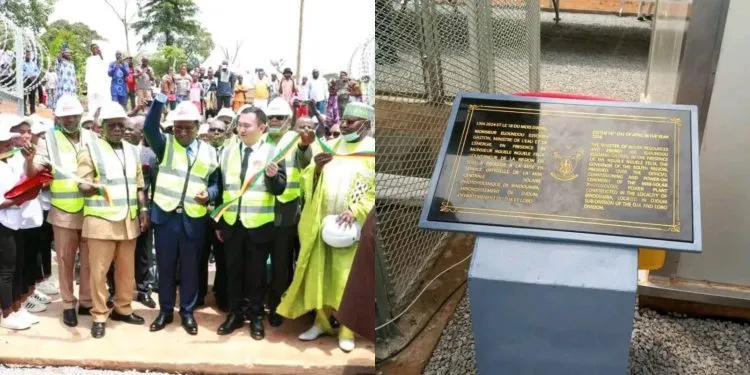The problem of electricity in the locality of Bindoumba and its two neighbours in Djoum Subdivision, Dja et Lobo Division, South Region, will now be a thing of the past, authorities have pledged.
That is because the Cameroon Government, through the Minister of Water and Energy, Gaston Eloundou Essomba, inaugurated the Bindoumba Solar Photovoltaic Power Plant on Thursday, April 18, which will supply electricity to the area and its environs.
The construction of the solar plant in the area is part of the Cameroon government’s policy to boost electricity to 25 percent by 2030 in rural areas of the country.
“In addition to supplying nearly 74 households in the locality of Bindoumba, the solar photovoltaic power plant will also provide access to electricity in two other neighboring villages,” minister Essomba.
In November 2023, the Cameroon government signed a cooperation agreement with China that will see solar energy plants constructed in 1000 rural areas of the country.
Currently, the project is ongoing in 86 localities in the different 10 regions of the country.
“The facility officially commissioned in Bindoumba is the very first power station of the third phase of the project to electrify 1,000 localities using solar photovoltaic systems,” the minister said.
According to Minister Gaston Eloundo, the use of solar is because these localities are very far from the interconnected electricity network.
The minister added that the lithium-ion battery has been introduced into the solar system, and as such, it will be able to provide electricity for 10 and 20 years of open installation.
Despite diverting into solar energy as an alternative to Cameroon’s electricity problem, the national coverage of household electrification still stands at 23 percent.
Meanwhile, the government has expressed its commitment to boost solar installation by 25 percent by 2030 as part of its nationally determined contribution.
According to statistics, 70 percent of Cameroon’s rural population (accounting for 60 percent of the total population) does not have access to electricity.
Meanwhile, Cameroon is blessed with abundant energy sources, yet they are underutilized. The country has constructed several hydroelectricity plants to boost electricity, but acute power outages persisted over the past months with several cities plunged into darkness.
Now, several cities, including Douala and Yaounde, are witnessing electricity rationing.
The British company ENEO is the sole distributor of electricity in Cameroon, and the company is in negotiations to sell its shares to the Cameroon government, which will see electricity in the country return to the hands of the state.
However, will the state’s management of its electricity make a difference? That is yet to be seen.



